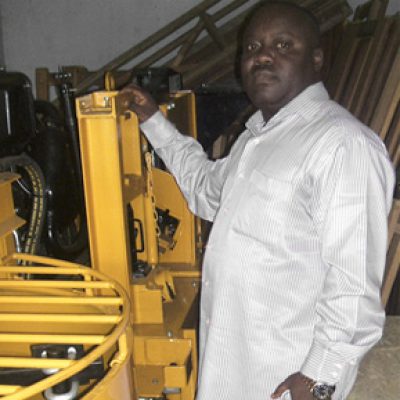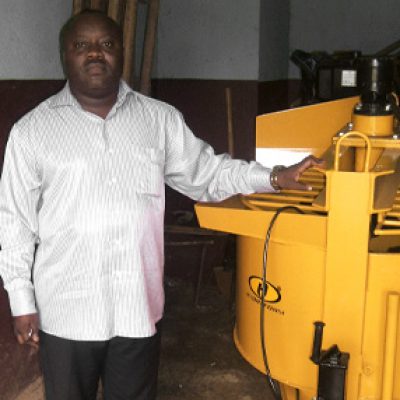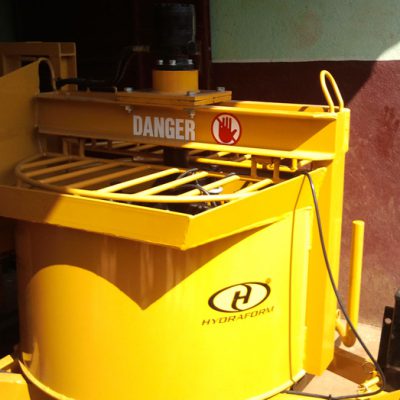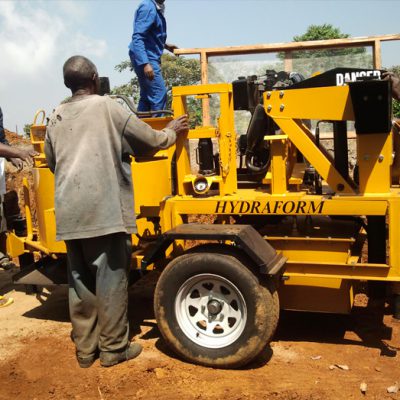The New Machine is Here
Given the difficulties of establishing steady goals in a volatile and changing financial environment, and to address our funding challenge, we invested in a hydraulic block machine that produces interlocking dry stacked soil-cement and environmentally friendly blocks.
“Aumazo’s ultimate goal is to build a boarding school that will become self-sustaining.”
The machine that we acquired in 2010 produces 1,500 interlocking dry stacked, soil-cement environmentally friendly blocks daily. In 2012, we used the machine to manufacture 26,000 blocks that allowed us to complete the library/study building. In 2013, we finally finally established and officially launched operations. We use the machine to produce and sell blocks as well as build houses, thus raising additional funds for reinvestment and sustainability of the business and later the school operating costs. The machine is ideal for working on remote sites where the use of electricity is not an option. The “block making machines hydraulically compress soil that contains a small amount of clay and silt mixed with cement into soil cement blocks. When cured, these can be dry-stacked with no mortar.” As a result, HYDRAFORM machines are ideal for sites where transport costs for cement and sand are high. The machine is mounted on wheels and can be moved from one site to the other. It has a diesel engine and requires 8L for a daily production of 1,500 blocks. The environmentally friendly nature of our blocks, their interlocking proprieties and the cost-effective use of our interlocking blocks set us apart from the competitor cinder blocks.
AUMAZO, INC. will measure the success of the block business and its potential in generating revenue to cover the operating costs of the school as soon as we open the doors of the school. This new instrument will help us decide on the expansion of our program beyond the borders of Cameroon to other African countries. According to Hydraform the manufacturer of our hydraulic block machine, many benefit can accrue to all clients. As a replacement for conventional brick and mortar these dry stacking blocks ensure:
- Minimal material costs – Little mortar is needed, because 75% of a Hydraform wall is dry-stacked. In addition, Hydraform walls contain up to 50% less cement than conventional cement brick walls.
- Reduced transport costs – Blocks can be made on the building site, which considerably reduces transport costs.
- Construction speed – A block layer can lay up to 800 blocks per day; the equivalent of laying 2 400 standard stock bricks per day.
- Versatility – All window, door, slab and roofing systems that are used with conventional systems can also be used with hydraulic blocks.
- Great ease of use – The hydraulic block system, because it uses dry-stacked Soil Cement Blocks, can be easily and simply taught to unskilled laborers.
- Genuine eco-friendliness – An average hydraulic wall has a carbon footprint that is as low as 40kg CO2 per square meter.
The machine is ideal for working on remote sites where the use of electricity is not an option. This machine will help us produce our own bricks to complete the construction of the boarding school and also provide a revenue stream that will allow us to sustain the operating costs of the school.
The machine arrived in Bankondji late July 2011 (see picture with Father Sylvestre). We are establishing a block yard production business. This business consists of producing blocks/bricks that will be sold to homeowners and other builders around the country. The sale of blocks will generate revenue that will be reinvested in the school to cover operating costs.
However, there is still a great challenge to overcome before reaching this final goal. We need to raise $50,000. This money will help us cover the cost of diesel, tools and materials for the setup of the block yard and training.
The manufacturer scheduled a training in November 28, 2011. A technician from the company will come on site in Cameroon to setup the machine for use and train Aumazo workers on operation, usage and maintenance of the machine.
We are starting a fundraiser to bring in the necessary funds needed to cover to operate the machine, manufacture bricks and cover the training costs. Each block costs $1 to production. Aumazo staff and board have launched a $1/brick campaign to raise the first $50,000 by November 28, 2011.
We do not take for granted your involvement in our Project Aumazo. However we want you to know that your invaluable support is very much appreciated by the staff and Aumazo board.
We need your help. Please support our fundraising effort.





